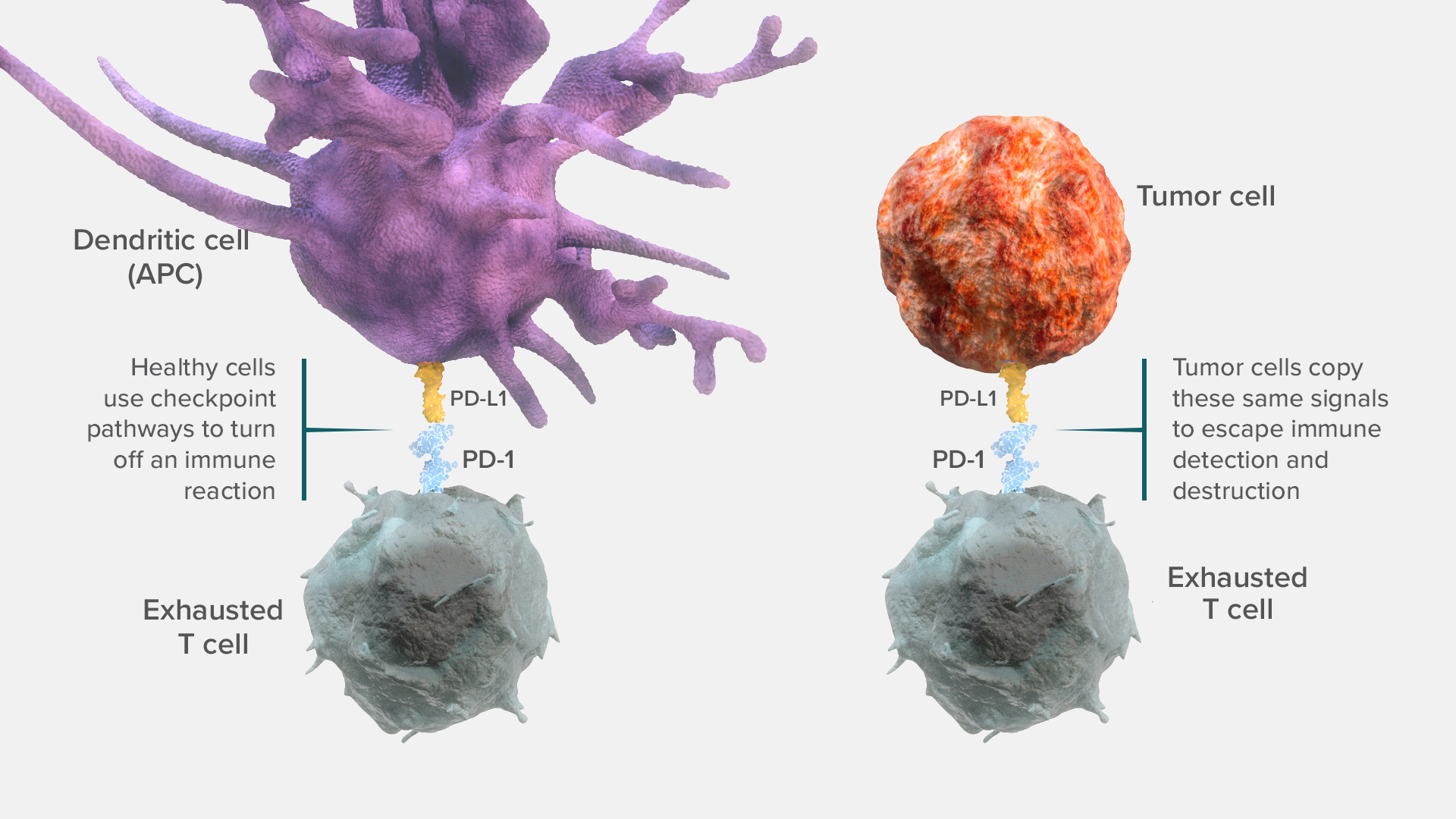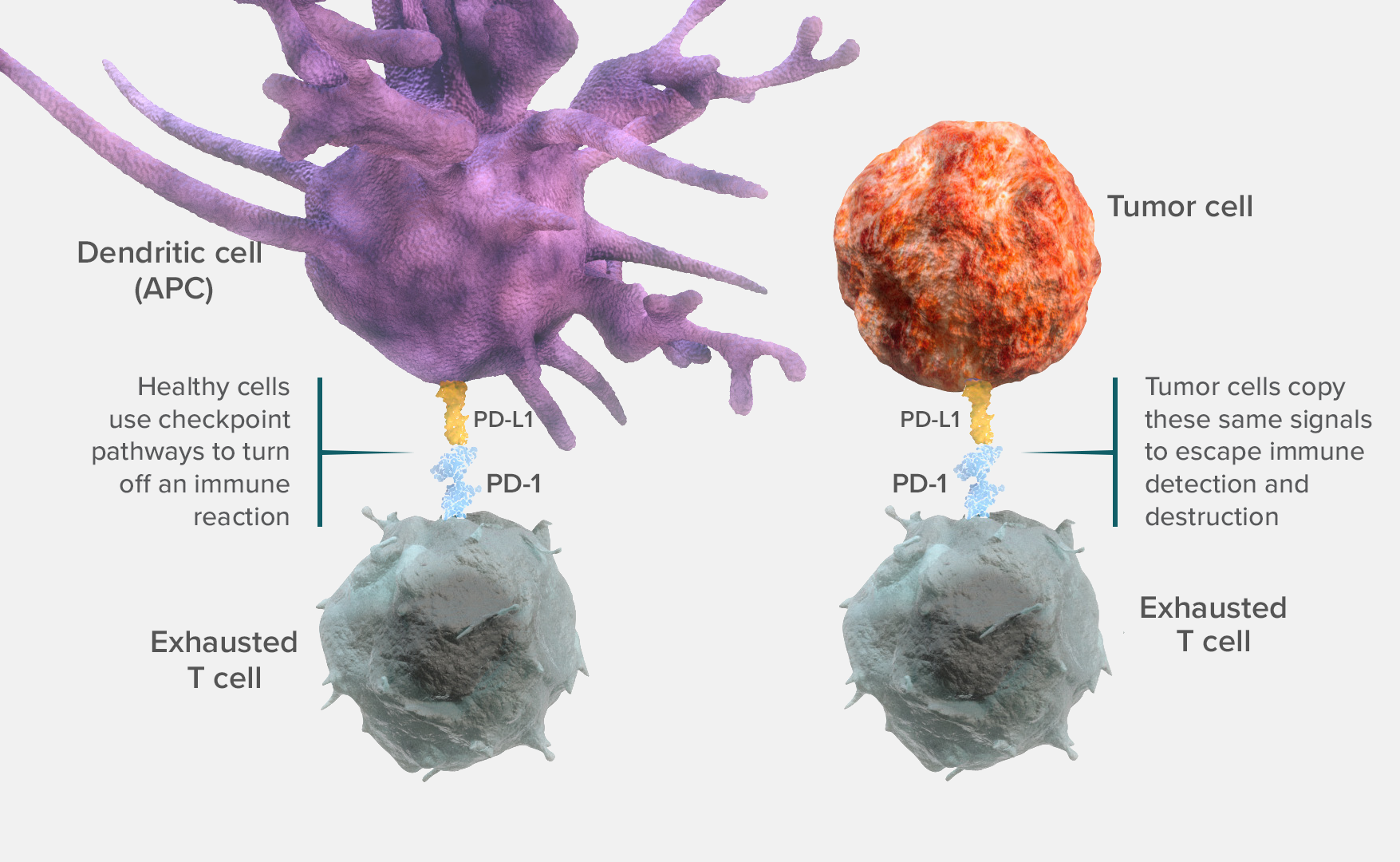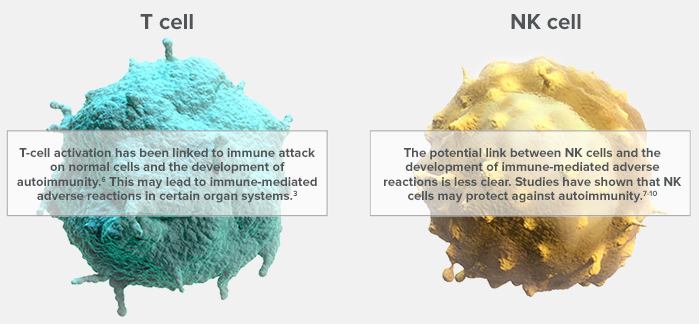Immune-Mediated Adverse Reactions
Antitumor immune activity can also affect healthy cells
Tumor cells are mutated versions of normal cells—they have changed into tumor cells that now grow uncontrollably.1 To survive and reproduce, however, tumor cells still use some of the same processes as normal cells.2


Immuno-Oncology therapies activate the immune response to overcome tumor survival and growth strategies. This can enable the immune system to attack healthy cells along with tumor cells. These effects are known as immune-mediated adverse reactions.3
Immune cells and immune-mediated adverse reactions
The link between immune activation and immune-mediated adverse reactions is an area of ongoing research. The activation of certain immune cells has been associated with autoimmunity.4 This connection may influence the likelihood of an immune-mediated adverse reaction.5


- T cells: T-cell activation has been linked to immune attack on normal cells and the development of autoimmunity.6 This may lead to immune-mediated adverse reactions in certain organ systems.3
- Natural Killer (NK) cells: The potential link between NK cells and the development of immune-mediated adverse reactions is less clear. Studies have shown that NK cells may protect against autoimmunity.7-10
Managing complications of immune-mediated adverse reactions
Patients, caregivers, and physicians should be educated to remain vigilant throughout and after Immuno-Oncology treatment to minimize complications, some of which may be life-threatening.3 In addition, treatment algorithms are available for use by health care providers to assist them in managing immune-mediated adverse reactions.11
As research in immune system activation advances and more data are made available, understanding and appropriate management of immune-mediated adverse reactions will evolve.12
References
1. Sharma P, Allison JP. The future of immune checkpoint therapy. Science. 2015;348(6230):56-64. 2. Vesely MD, Kershaw, Schreiber RD, Smyth MJl. Natural Innate and Adaptive Immunity to Cancer. Ann Rev Immunol. 2011;29:235-271. 3. Amos SM, Duong CPM, Westwood JA, et al. Autoimmunity associated with immunotherapy of cancer. Blood. 2011;118:499-509. 4. Nishimura H, Okazaki T, Tanaka Y, et al. Autoimmune Dilated Cardiomyopathy in PD-1 Receptor-Deficient Mice. Science. 2001;291(5502):319-322. 5. Mellman I, Coukos G, Dranoff G. Cancer immunotherapy comes of age. Nature. 2011;480:480-490. 6. Waterhouse P, Penninger JM, Timms E, et al. Lymphoproliferative Disorders with Early Lethality in Mice Deficient in CtIa-4. Science. 1995;270(5238):985-988. 7. Aramaki T, Ida H, Izumi Y, et al. A significantly impaired natural killer cell activity due to a low activity on a per-cell basis in rheumatoid arthritis. Mod Rheumatol. 2009;19(3):245-252. 8. Fort MM, Leach MW, Rennick DM. A Role for NK Cells as Regulators of CD4+ T Cells in a Transfer Model of Colitis. J Immunol. 1998;161(7):3256-3261. 9. Park YW, Kee SJ, Cho YN, et al. Impaired Differentiation and Cytotoxicity of Natural Killer Cells in Systemic Lupus Erythematosus. Arthritis Rheum. 2009;60(6):1753-1763. 10. Zhang B, Yamamura T, Kondo T, Fujiwara M, Tabira T. Regulation of Experimental Autoimmune Encephalomyelitis by Natural Killer (NK) Cells. J Exp Med. 1997;186(10):1677-1687. 11. Gelao L, Criscitiello C, Esposito A, Goldhirsch A, Curigliano G. Immune Checkpoint Blockade in Cancer Treatment: A Double-Edged Sword Cross-Targeting the Host as an “Innocent Bystander”. Toxins (Basel). 2014;6(3):914-933. 12. Bertrand A, Kostine M, Barnetche T, Truchetet ME, Schaeverbeke T. Immune related adverse events associated with anti-CTLA-4 antibodies: systematic review and meta-analysis. BMC Med. 2015;13:211-224.

